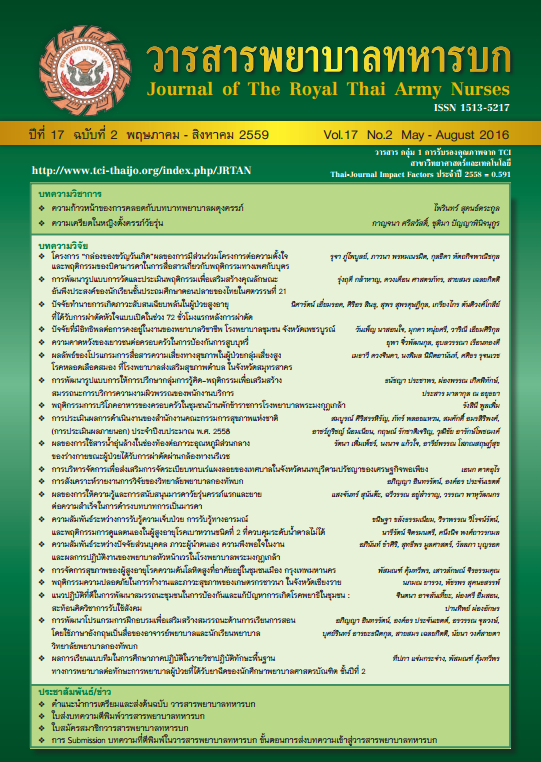ความสัมพันธ์ระหว่างการรับรู้ความเจ็บป่วย การรับรู้ทางอารมณ์ และพฤติกรรมการดูแลตนเองในผู้สูงอายุโรคเบาหวานชนิดที่ 2 ที่ควบคุมระดับน้ำตาลไม่ได้
Keywords:
การรับรู้ความเจ็บป่วย, การรับรู้ทางอารมณ์, พฤติกรรมการดูแลตนเอง, ผู้สูงอายุ, โรคเบาหวานชนิดที่ 2, Illness representations, Emotional representation, Self - care behaviors Older persons, Type 2 diabetesAbstract
การศึกษาครั้งนี้เป็นการวิจัยเชิงบรรยายหาความสัมพันธ์ มีวัตถุประสงค์เพื่อศึกษาความสัมพันธ์ระหว่างการรับรู้ความเจ็บป่วย การรับรู้ทางอารมณ์และพฤติกรรมการดูแลตนเองในผู้สูงอายุโรคเบาหวานชนิดที่ 2 ที่ควบคุมระดับน้ำตาลไม่ได้ คัดเลือกกลุ่มตัวอย่างแบบสะดวก จำนวน 88 ราย เก็บรวบรวมข้อมูลโดยใช้แบบสอบถามจำนวน 3 ชุด ได้แก่ แบบสอบถามข้อมูลส่วนบุคคลแบบสอบถามการรับรู้ความเจ็บป่วยด้วยโรคเบาหวาน แบบวัดกิจกรรมการดูแลตนเองในผู้เป็นเบาหวาน วิเคราะห์ความสัมพันธ์โดยใช้สัมประสิทธ์สหสัมพันธ์เพียร์สันผลการวิจัยพบว่า ตัวแปรที่ความสัมพันธ์กับพฤติกรรมการดูแลตนเองอย่างมีนัยสำคัญทางสถิติ คือ การรับรู้ลักษณะเฉพาะของการเจ็บป่วย (r = .486, p<.01) การรับรู้ระยะเวลาของการเจ็บป่วย (r = -.381, p<.01) และการรับรู้ผลที่เกิดตามมาจากการเจ็บป่วย (r = .243, p<.05) ส่วนตัวแปรที่ไม่มีความสัมพันธ์กับพฤติกรรมการดูแลตนเอง คือ การรับรู้ความสามารถในการควบคุมหรือรักษาความเจ็บป่วย (r = -.057) และ การรับรู้ทางอารมณ์ที่เกิดจากโรคเบาหวาน (r = .127) ผลการศึกษาสามารถนำไปใช้เป็นข้อมูลพื้นฐานในการประเมินการรับรู้ความเจ็บป่วยสำหรับบุคลากรทางสุขภาพ ใช้ในการจัดทำแนวทางในการวางแผนการดูแล โดยส่งเสริมให้ผู้ป่วยเบาหวานมีความเข้าใจและรับรู้การเจ็บป่วยด้วยโรคเบาหวานในด้านลักษณะเฉพาะของการเจ็บป่วย ระยะเวลาของการเจ็บป่วย และผลที่เกิดตามมาจากการเจ็บป่วย เพื่อให้ผู้ป่วยมีการปรับเปลี่ยนพฤติกรรมการดูแลตนเองที่เหมาะสม สามารถควบคุมระดับน้ำตาลในเลือด และชะลอการเกิดภาวะแทรกแทรกซ้อนที่เกิดจากโรคเบาหวานได้
The Relationships Between Illness Representations, Emotional Representation And Self - Care Behaviors In Older Persons With Uncontrolled Type 2 Diabetes
The present descriptive correlational research aimed at investigating the relationships among illness representations, emotion representations, and self-care behaviors in older persons with uncontrolled type 2 diabetes mellitus. The study sample, recruited by means of convenience sampling, consisted of 88 older persons with uncontrolled type 2 diabetes mellitus. Data were collected based on three questionnaires : the personal data questionnaire, the revised illness perception questionnaire, and the summary of diabetes elf-care activities questionnaire. Pearson’s product moment correlation coefficient was used in the data analysis. The research findings showed that the studied variables that were statistically significantly related to self-care behaviors in older persons with uncontrolled type 2 diabetes mellitus were identity of illness (r = 0.486, p < 0.01), timeline of illness (r = -0.381, p < 0.01), and perceived consequences of illness (r = 0.243, p < 0.05). On the other hand, the variables that were not associated with self-care behaviors were
controllability/curability of illness (r = -0.057) and emotion representations (r = 0.127). The study findings could be used as baseline data for health care teams to assess illness representations and to devise a guideline on care plan. Promoting patients’ illness representations of type 2 diabetes mellitus in terms to identity of illness, timeline of illnessand consequences of illness. This is recommended so that they would be able to developand maintain appropriate self-care behaviors to control fasting blood sugar levels and prolong onset of possible diabetic complications.
Downloads
Downloads
How to Cite
Issue
Section
License
บทความหรือข้อคิดเห็นใดใดที่ปรากฏในวารสารพยาบาลทหารบกเป็นวรรณกรรมของผู้เขียน ซึ่งบรรณาธิการหรือสมาคมพยาบาลทหารบก ไม่จำเป็นต้องเห็นด้วย
บทความที่ได้รับการตีพิมพ์เป็นลิขสิทธิ์ของวารสารพยาบาลทหารบก
The ideas and opinions expressed in the Journal of The Royal Thai Army Nurses are those of the authors and not necessarily those
of the editor or Royal Thai Army Nurses Association.






